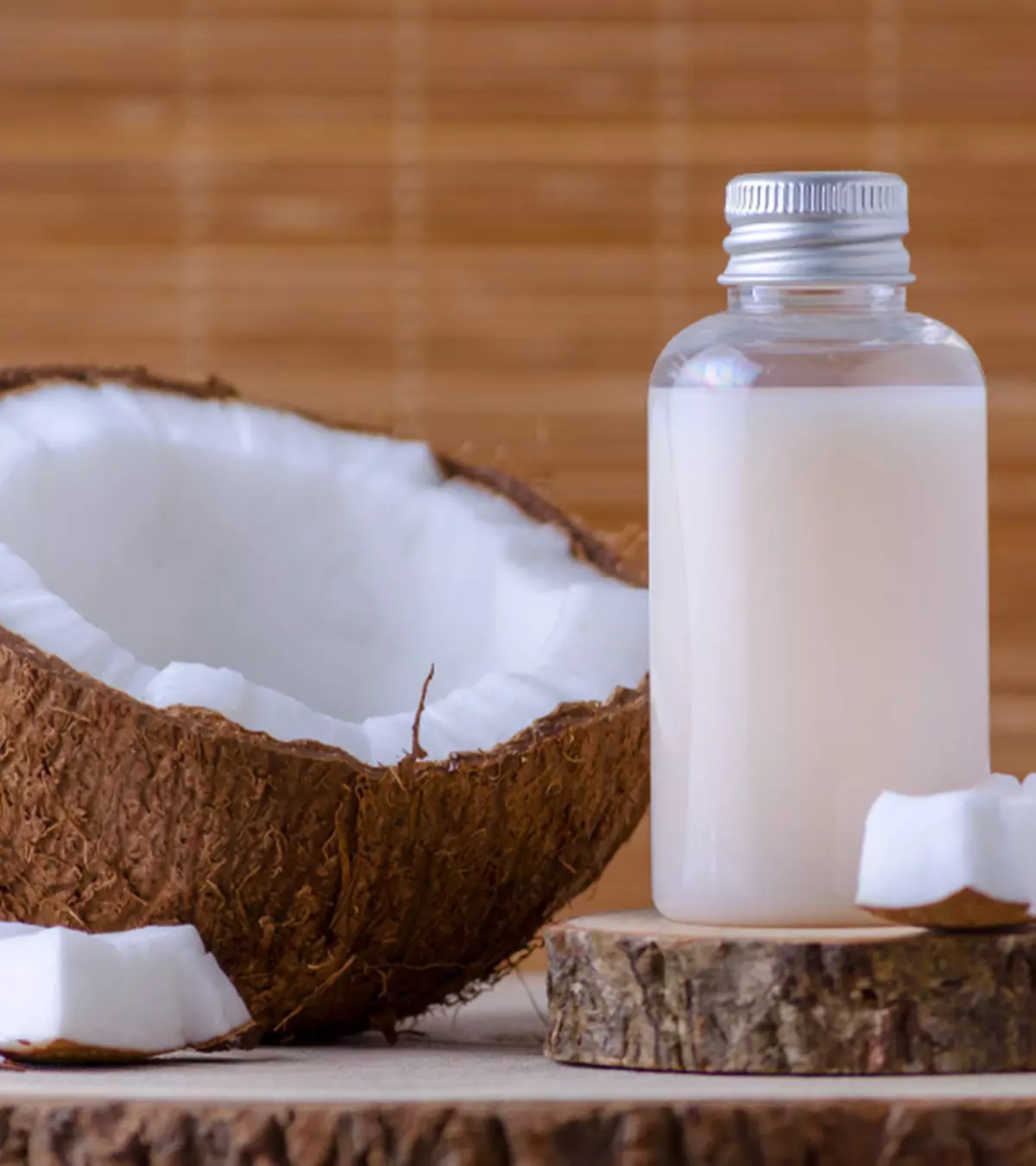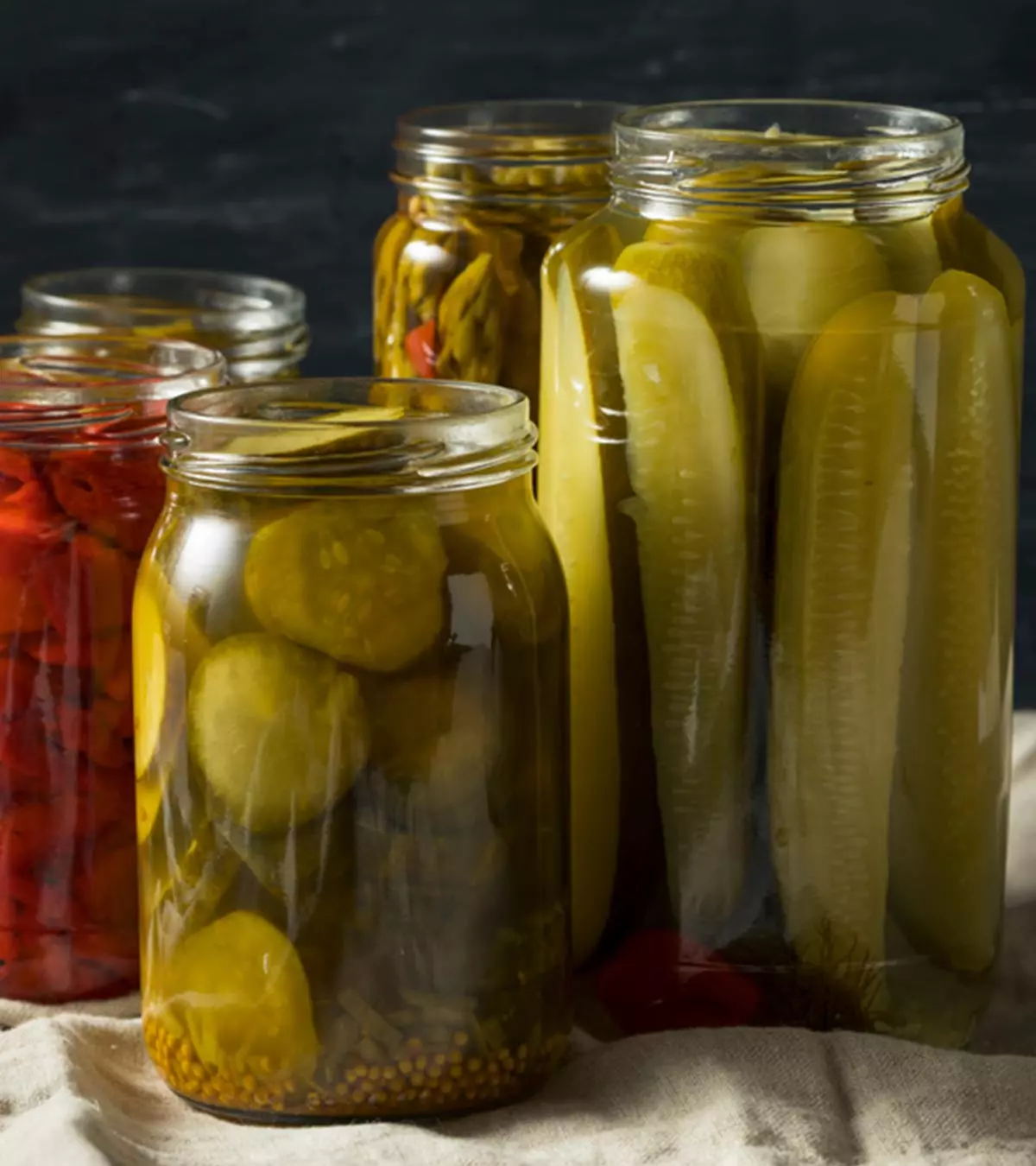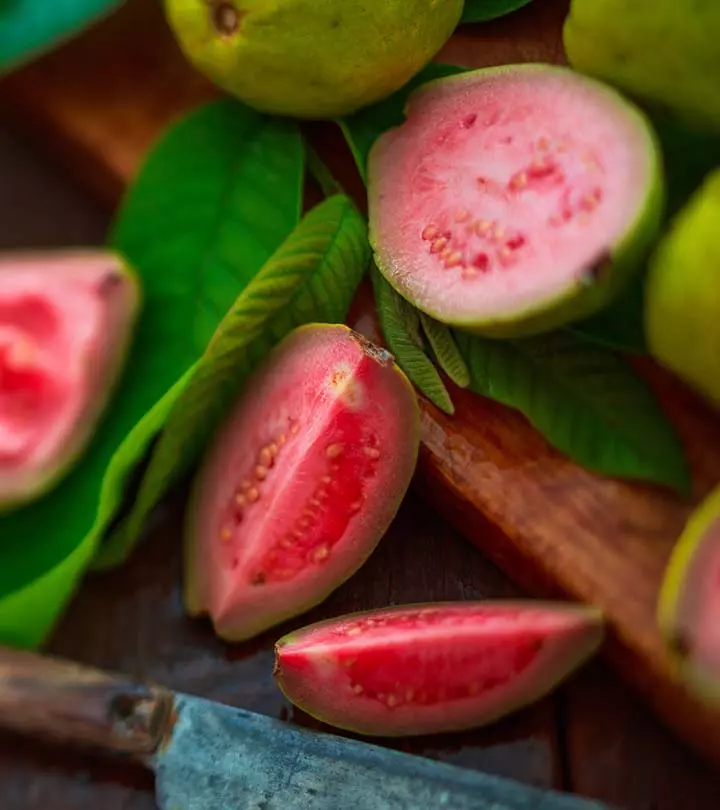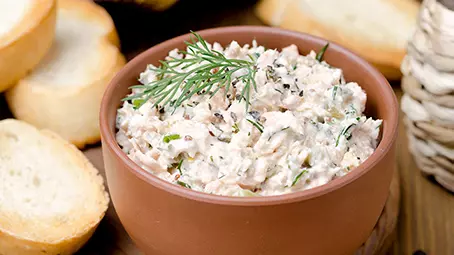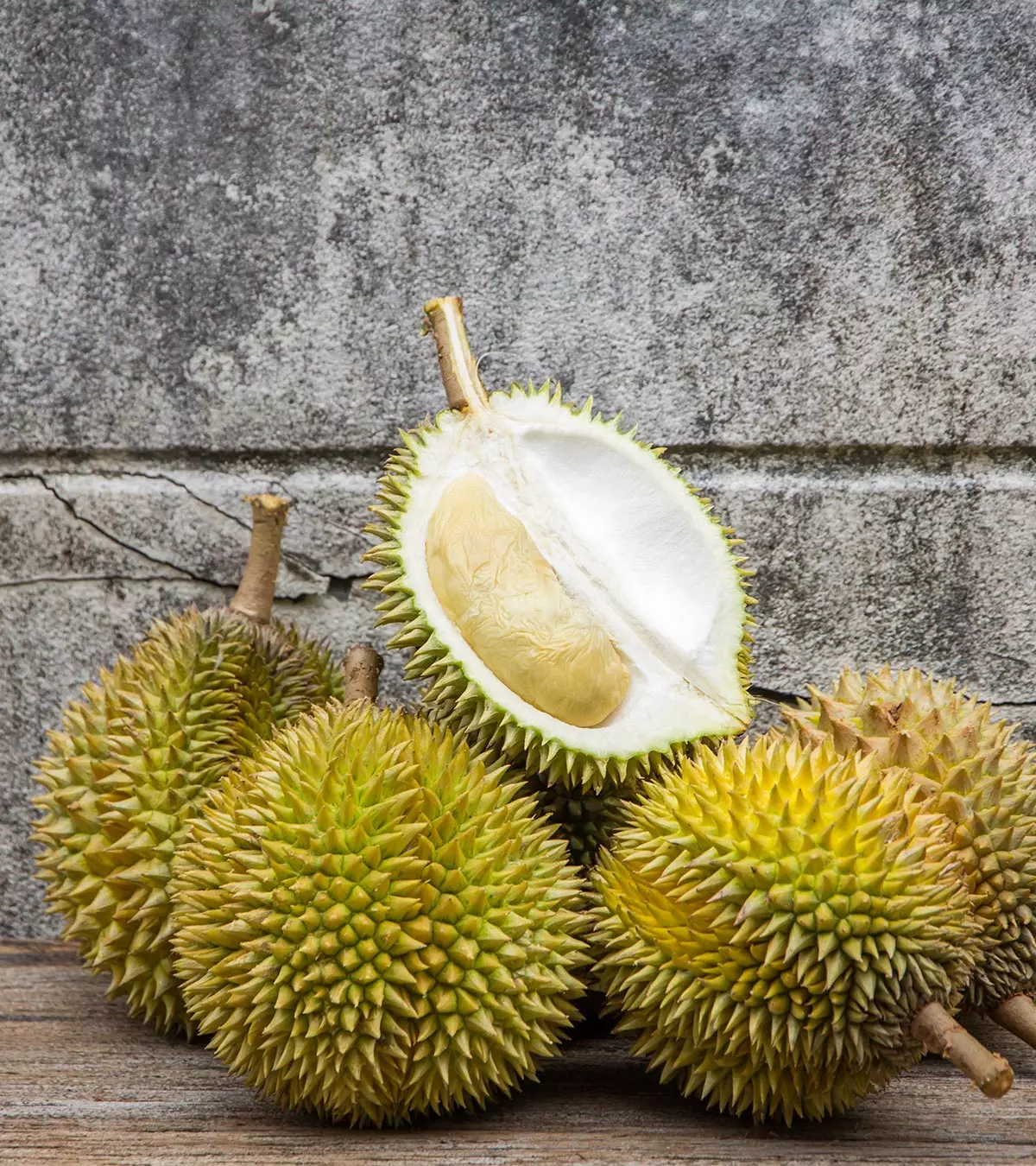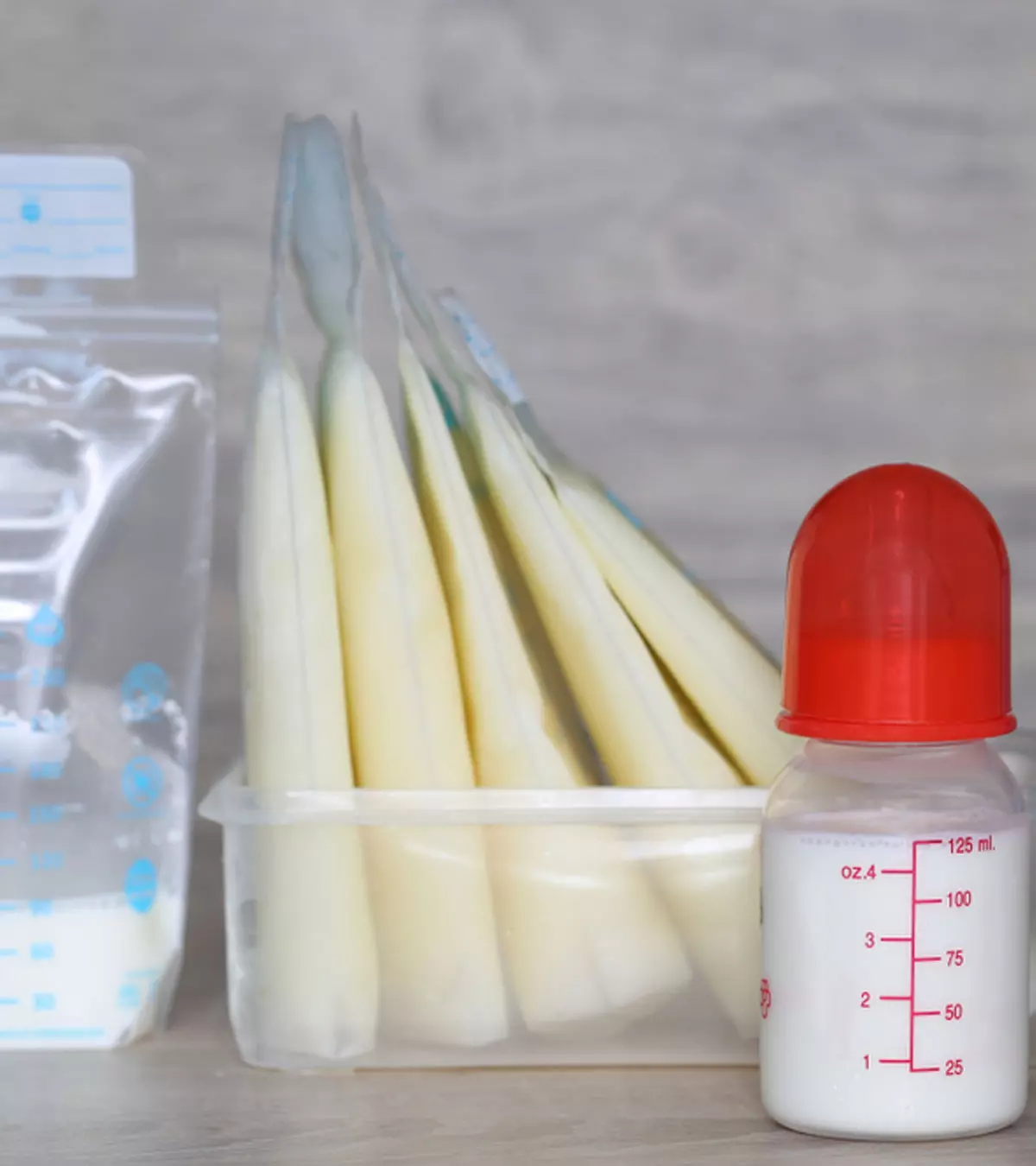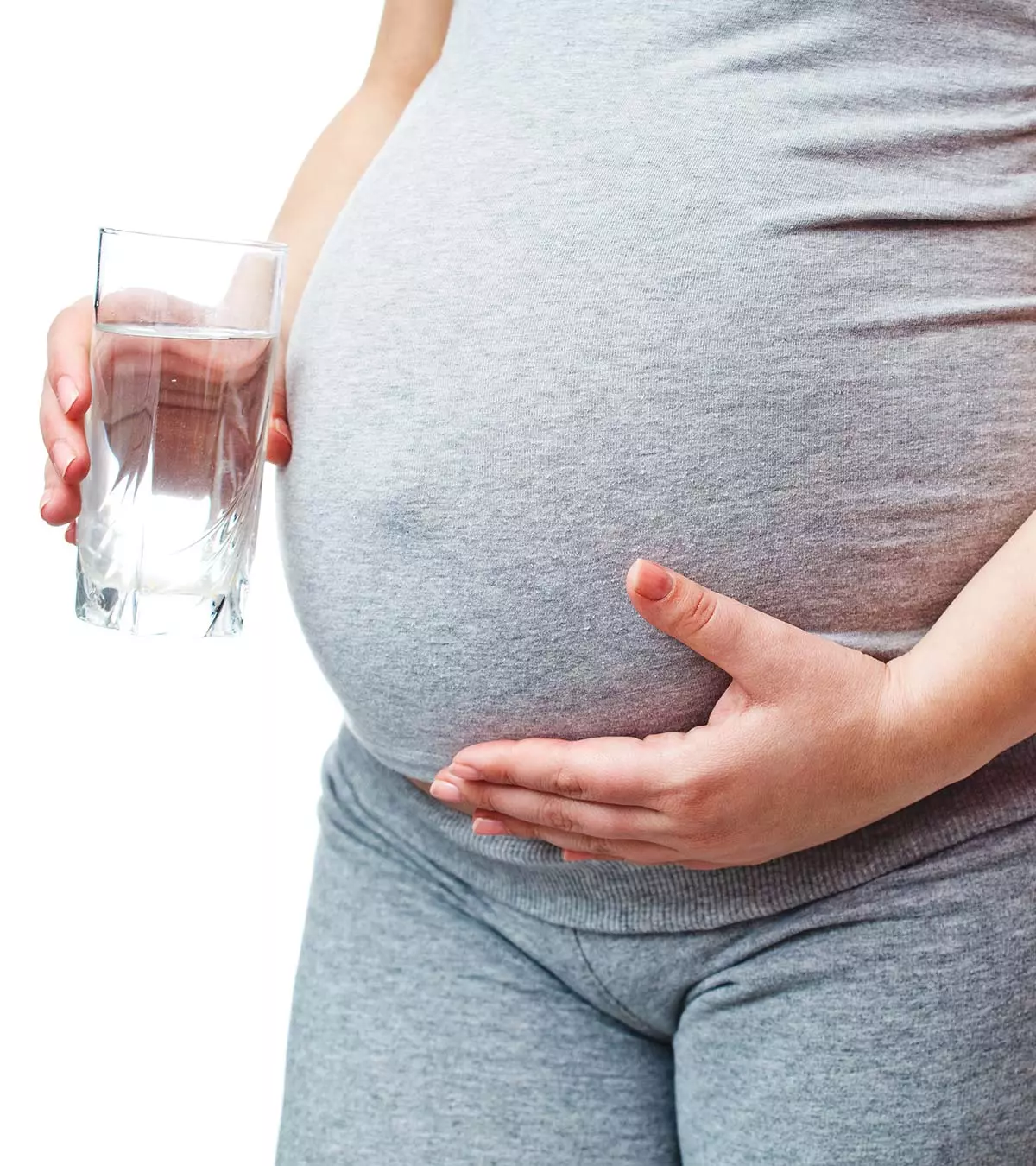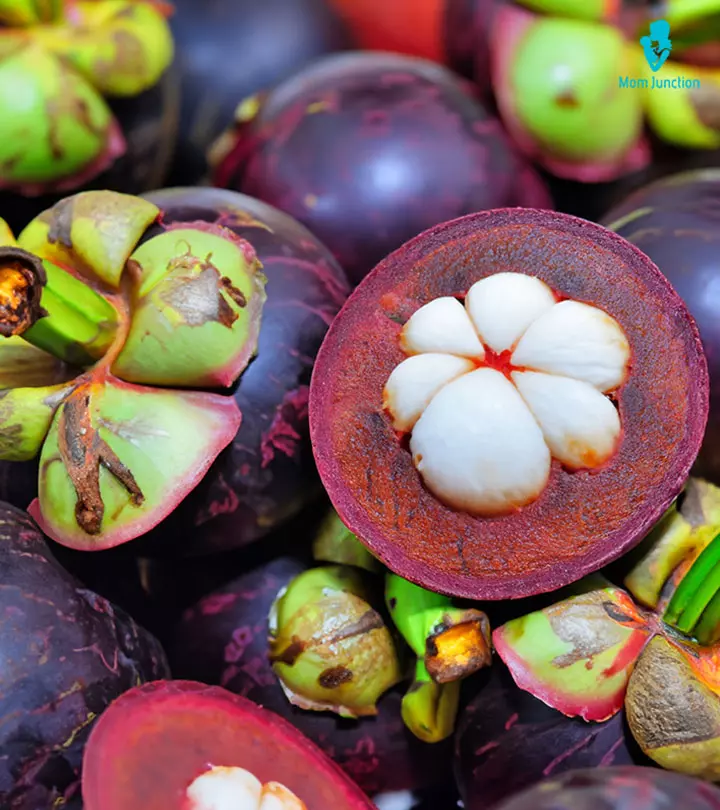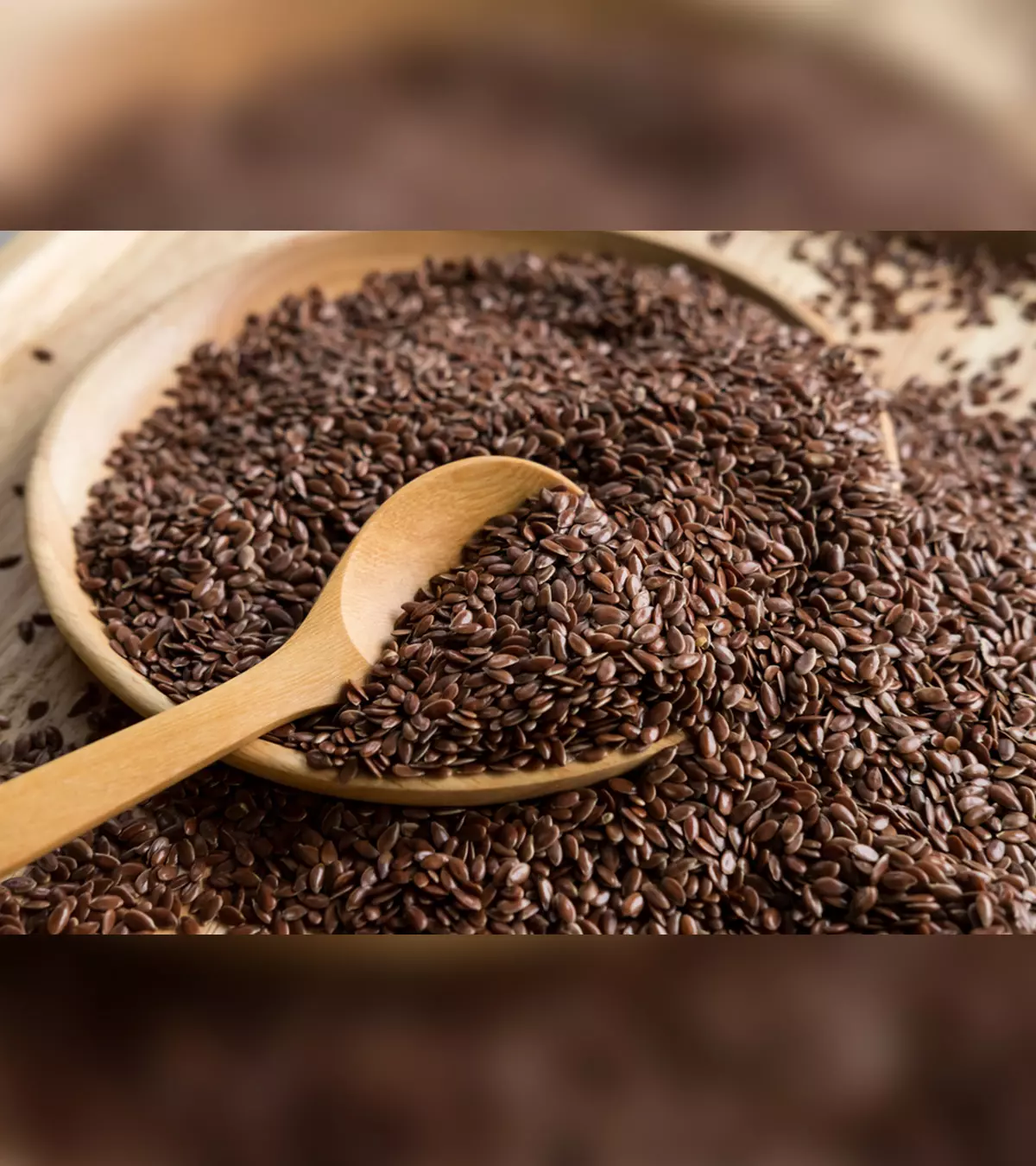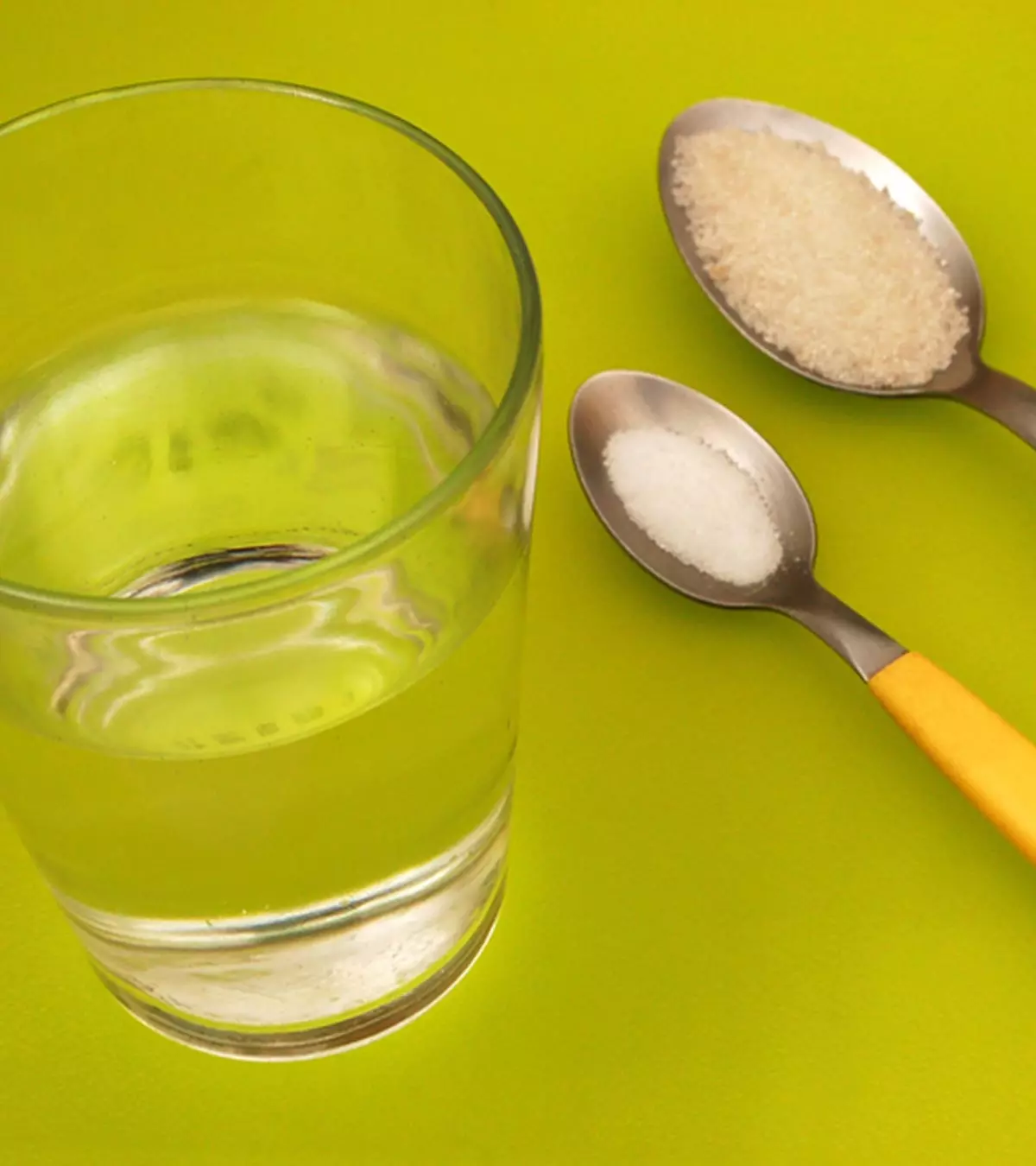
Image: iStock
Pagophagia, the most common type of pica during pregnancy, is a term used to describe the habit of eating ice while pregnant. Pica is an unusual craving for non-edible items, such as toothpaste, chalk, and soil, and some women experience it during pregnancy.
Occasionally chewing on ice may be refreshing and help ease some pregnancy-related symptoms such as morning sickness. However, frequent consumption of cold items during pregnancy may be harmful. Read on to know the reasons, risks, and management of this ice-eating habit in pregnancy.
Key Pointers
- Studies show that about 54% of pregnant women crave ice as part of the unusual pregnancy longings.
- Craving ice during pregnancy can be due to certain underlying conditions such as iron deficiency, stress, or heartburn.
- Although common, it can result in tooth damage, jaw displacement, and a loss of electrolytes in the body.
- Consulting a therapist or deficiency test may help you cope with your ice cravings.
Is It Safe To Eat Ice When Pregnant?
Ice consumption is among the most common types of pica during pregnancy, along with raw starches and earth (1). While usually this pica is not dangerous, consult a medical professional if this food craving during pregnancy lasts for more than a week to ensure prenatal safety.
Having hematiniciSubstances including iron, vitamin B12, and folic acid, that help in the formation of blood cells. sometimes relaxes the pica, if it was specifically due to anemia (low hemoglobin levels).
Do Ice Cravings Indicate Pregnancy?
Ice craving commonly appears early on in the gestation period though it is often ignored. A study reported that 215 out of 281 participants indulged in pica practices during pregnancy, of which 54% consumed ice during pregnancy (2). However, ice craving is not a reliable sign of pregnancy. Hence, it is recommended to take a pregnancy test.
Why Do Pregnant Women Crave Ice?
Though various cultural, physiological, nutritional, and psychological theories explore the causes for ice craving in pregnancy, the exact cause is unknown (2).
Ice cravings in pregnant women could be the body’s way of communicating underlying nutrient deficiencies. For example, a study found associations between ice cravings and iron deficiency anemia and suggested that chewing ice causesvascular changesiChanges in the blood vessels that carry oxygen and essential nutrients to the tissues in the body. in the brain that increase alertness in anemic patients (3). Having a blood transfusion sometimes relaxes the pica.
Some of the illnesses associated with pregnancy that may induce ice cravings are (2) (4) (5) (6)
- Morning sickness (nausea and vomiting)
- Iron deficiency with or without anemia
According to gynecologist & obstetrician Dr. Nisarg Patel, “Anemia is common during pregnancy due to the extra demand for nutrients that the fetus needs, so it’s essential to get tested for it if you are experiencing unusual cravings for ice or other non-nutritive substances. Also, ice has no nutritional value, and eating it in large amounts can lead to nutrient deficiencies such as calcium, magnesium, and zinc.”

Image: Shutterstock
- Low hemoglobin level
- Heartburn oracid refluxiAlso known as gastroesophageal reflux (GER), a condition that happens when acids from the stomach flow backwards into the esophagus.
- Burning mouth syndrome
- Stress or emotional distress
Some neurological conditions, such as obsessive-compulsive disorders, might manifest through pica. In addition, African-American women are more likely to experience pica in pregnancy than other ethnicities (7).
 Quick fact
Quick factAre There Any Benefits To Eating Ice?
Ice consumption has the following benefits (8):
- Soothes the body and lowers the core temperature
- Hydrates the body
Though eating ice may offer hydration, it is not a replacement for drinking water. Additionally, frequent ice consumption can lead to health problems.
 Quick fact
Quick factWhat Are The Risks Of Excessive Ice Consumption In Pregnancy?
The following are some of the complications associated with consuming ice during pregnancy and its impact on maternal health (7) (9) (10) (11):
- Damage to the teeth and enamel
- Gum infection and cavities

Image: Shutterstock
- Jaw alterations
- Depletion of electrolytes in the body, causing uncommon complications such as seizures
- Metabolic disorders such as lead enrichment and poisoning
- According to one study, the head circumference of such babies may be smaller than average.
- Prone to gastrointestinal complications
In some cases, intense cravings might also lead to feelings of frustration, irritability, or anxiety.
Sophia Garcia, a mum of two, had ice cravings when she was pregnant with her second child. Sharing her experience, she says, “I would have been about seven months pregnant with my second daughter. I forced my fiance to stop at the nearest Quick Trip and pick me up a 32 oz cup with nothing but ice. Two months later, I have a stockpile of 50 plastic to-go cups ranging from 44 to 52 oz each. I ate about 150 oz a day. The ice addiction is real, and I have woken up or stayed up late several times to eat ice, and I have left the house in the middle of the night to go get it (ⅰ).”
How Can The Urge To Consume Ice When Pregnant Be Managed?
The treatment for the pica of ice consumption may vary based on the cause for the urge
. An experienced medical practitioner should warrant if the symptoms require intervention during pregnancy. The pica of chewing ice can be managed by (7)
- Testing for deficiencies: If iron deficiency is found, restoring the nutrient and electrolyte balanceiThe proper balance of all minerals in the body. by having an iron-rich diet and consuming iron supplements can help.
- Counseling: The pica could have a psychological origin. Hence, consultation with a psychiatrist followed by counseling and assessment is recommended. Additionally, psychoactive drugsiDrugs that affect the way the brain works and change mood, feelings, and behavior. such as antidepressants may help reduce the symptoms.

Image: Shutterstock
Furthermore, the cravings may be managed by staying hydrated with water and electrolyte-rich fluids and incorporating iron-rich foods into your diet to address potential deficiencies. However, you may seek professional guidance for psychological support if cravings persist.
Frequently Asked Questions
1. How do I know I have iron deficiency during pregnancy?
If you have iron deficiency during pregnancy, you will have pale skin, nails, and underside of eyelids and may experience fatigue, vertigoiA spinning or moving sensation similar to dizziness. , difficulty in concentration, and rapid heartbeat (12).
2. Does craving for ice indicate the sex of the unborn baby?
No. Cravings may be a sign of nutritional deficiency; however, they do not help you determine the sex of your baby. The sex of the baby can only be known by an ultrasound scan (13).
3. Is there a specific amount of ice that should be consumed while pregnant?
There is no specific amount of ice that a pregnant woman can consume during pregnancy. If you crave it, eat in moderation. Consult your doctor during your next prenatal visit and get tested for iron deficiency.
4. What nutrition can be gained from eating ice while pregnant?
Inadequate research is available to outline the nutritional value of consuming ice by a pregnant woman. You can consult your doctor to know any possible nutritional benefits of it.
5. Does eating ice while pregnant increase the risk of dehydration?
Insufficient clinically significant evidence exists to pinpoint the link between consuming ice and the risk of dehydration. It is important to outline that eating ice may provide hydration but should not be substituted for water.
6. Can eating ice trigger nausea and vomiting during pregnancy?
Nausea and vomiting are common during pregnancy and are usually named ‘morning sickness.’ No research indicates that ice could trigger nausea and vomiting; however, it may help reduce the occurrence. The metallic taste in the mouth is believed to be reduced by consuming ice chips (15). However, if you are experiencing any symptoms, consult with your doctor.
7. Can eating ice during pregnancy harm the baby?
There is limited evidence available to validate the claim that consuming ice harms the baby during pregnancy.
Craving ice while pregnant isn’t uncommon. In most cases, a craving for ice usually appears during the early pregnancy period. However, some women may continue craving ice until the later stages of pregnancy. Several theories revolve around its occurrence, but the precise cause for ice craving during pregnancy is unknown. Yet, it is often linked to mineral deficiency or low hemoglobin levels. Consuming ice with caution and in moderation does not harm the mother or fetal development. However, its excess could lead to issues such as gum infections and enamel damage.
Infographic: How To Determine If Your Ice Craving Is Unhealthy?
Ice craving is common, but as mentioned above, it may also indicate an underlying problem. You may check for a pattern in your ice cravings to determine if you should seek medical advice. This infographic provides you with questions to ask yourself to understand the reason behind your ice cravings during pregnancy. Illustration: Momjunction Design Team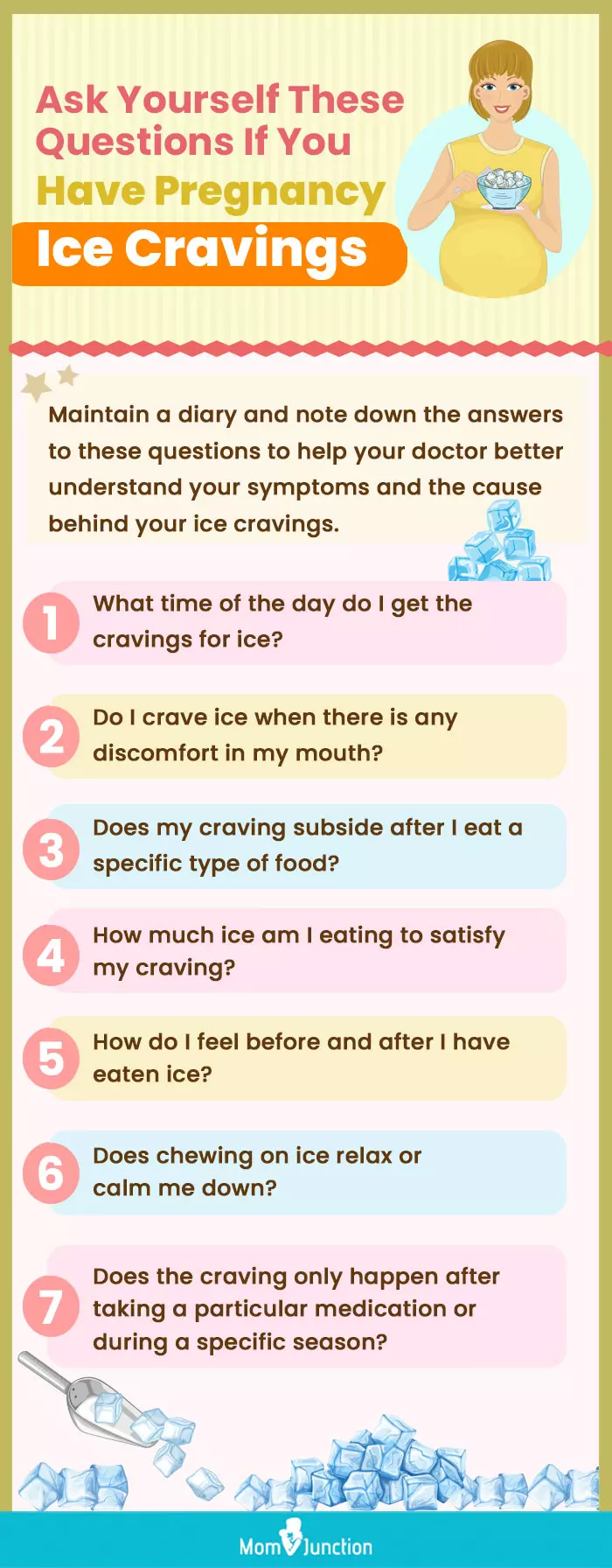
Illustration: Eating Ice When Pregnant: Safety Reasons Benefits And Risks
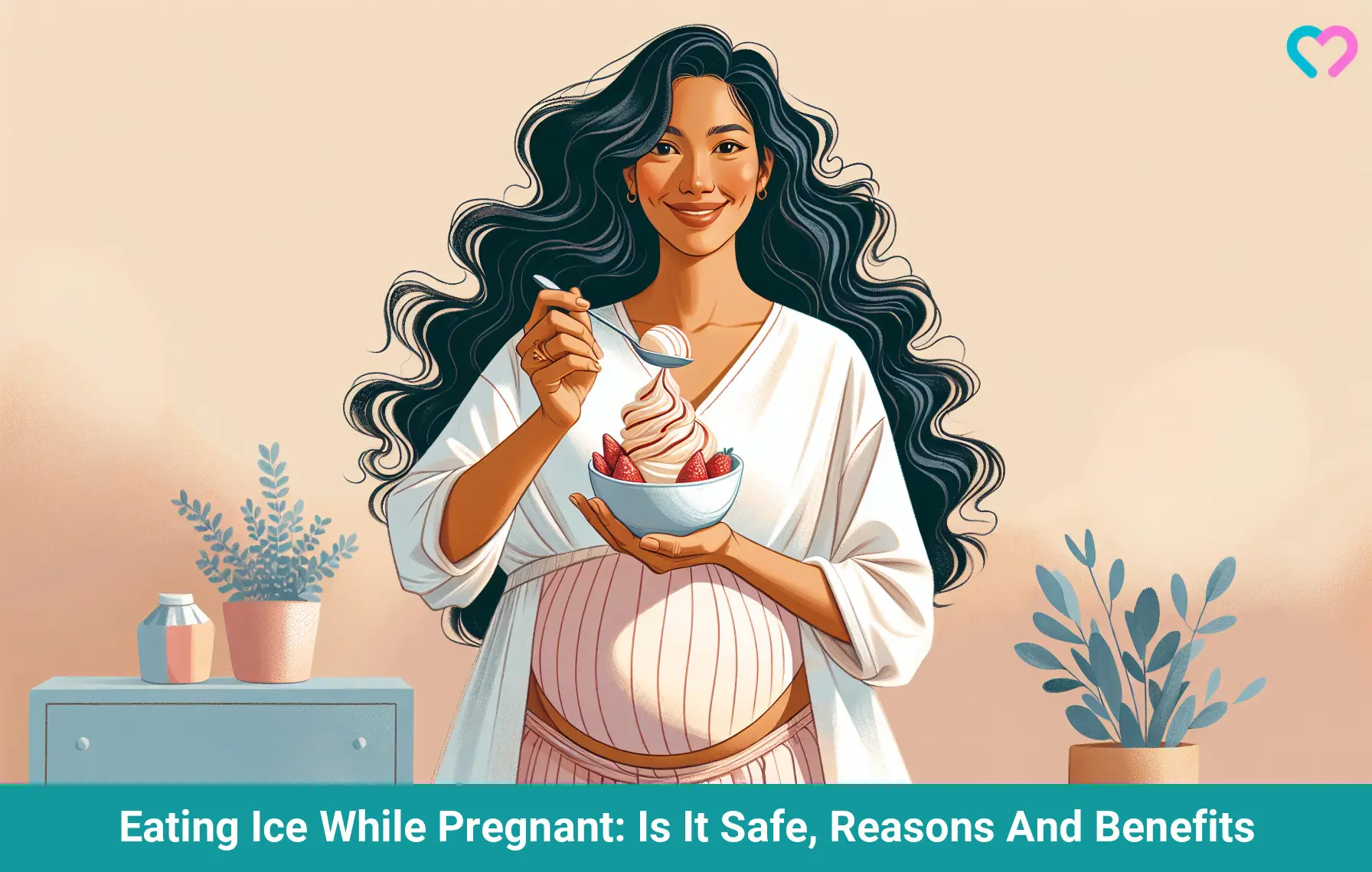
Image: Dall·E/MomJunction Design Team
Personal Experience: Source
MomJunction articles include first-hand experiences to provide you with better insights through real-life narratives. Here are the sources of personal accounts referenced in this article.
i. Anemia and Ice Eating During Pregnancy.https://dirtykidhands.wordpress.com/2015/04/20/anemia-and-ice-eating-during-pregnancy/
References
- Practices of pica among pregnant women in a tertiary healthcare facility in Ghana.
https://onlinelibrary.wiley.com/doi/full/10.1002/nop2.451 - Pagophagia And Hemoglobin Levels In Pregnant Women.
https://athenacommons.muw.edu/cgi/viewcontent.cgi?article=1041&context=msn-projects - Pagophagia improves neuropsychological processing speed in iron-deficiency anemia.
https://www.sciencedirect.com/science/article/pii/S0306987714002710 - Nutrient intake in women with pagophagia and other forms of pica during the pregnancy.
https://pubmed.ncbi.nlm.nih.gov/18051989/ - Ask the doctor: What causes a craving for ice?
https://www.health.harvard.edu/staying-healthy/what-causes-a-craving-for-ice - Nocturnal Pagophagia Complicating Gastric Bypass.
https://www.mayoclinicproceedings.org/article/S0025-6196(11)60774-X/fulltext - What are the pharmacologic options for managing pica in pregnant women?
https://dig.pharmacy.uic.edu/faqs/2020-2/november-2020-faqs/what-are-the-pharmacologic-options-for-managing-pica-in-pregnant-women/ - Crushed ice ingestion – a practical strategy for lowering core body temperature.
https://jmvh.org/article/crushed-ice-ingestion-a-practical-strategy-for-lowering-core-body-temperature/ - Is chewing ice bad for you?
https://www.affinitydental.co.za/is-chewing-ice-bad-for-you/ - Pica/Pagophagia-Associated Hyponatremia: Patient Presenting With Seizure.
https://www.ncbi.nlm.nih.gov/pmc/articles/PMC7384452/ - Are anemia gastrointestinal disorders and pregnancy outcome associated with pica behavior?
https://content.iospress.com/articles/journal-of-neonatal-perinatal-medicine/npm190257 - Anemia in Pregnancy.
https://www.cedars-sinai.org/health-library/diseases-and-conditions/a/anemia-in-pregnancy.html - Gender positions and cravings in pregnancy: truth or myth
https://www.nct.org.uk/information/pregnancy/body-pregnancy/eating-pregnancy-and-after-birth - Why Pregnancy Can Make You Have Weird Cravings
https://intermountainhealthcare.org/blogs/why-pregnancy-can-make-you-have-weird-cravings - Nausea and vomiting in pregnancy
https://www.fraserhealth.ca/health-topics-a-to-z/pregnancy-and-baby/pregnancy/nausea-and-vomiting-in-pregnancy
Community Experiences
Join the conversation and become a part of our nurturing community! Share your stories, experiences, and insights to connect with fellow parents.
Read full bio of Dr. Annal Vaidya
- Dr. Nisarg Patel is a gynecologist, obstetrician, and laparoscopic surgeon from Ahmedabad, India, with over 13 years of experience in the field. He did his post graduation in Obstetrics and Gynecology from Pravara Institute of Medical Sciences, Ahmednagar, and holds a fellowship of Reproductive Medicine.
 Dr. Nisarg Patel is a gynecologist, obstetrician, and laparoscopic surgeon from Ahmedabad, India, with over 13 years of experience in the field. He did his post graduation in Obstetrics and Gynecology from Pravara Institute of Medical Sciences, Ahmednagar, and holds a fellowship of Reproductive Medicine.
Dr. Nisarg Patel is a gynecologist, obstetrician, and laparoscopic surgeon from Ahmedabad, India, with over 13 years of experience in the field. He did his post graduation in Obstetrics and Gynecology from Pravara Institute of Medical Sciences, Ahmednagar, and holds a fellowship of Reproductive Medicine.
Read full bio of Anshuman Mohapatra
Read full bio of Rebecca Malachi
Read full bio of Dr. Joyani Das












